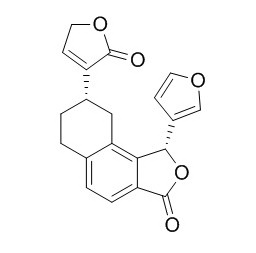Tilifodiolide
Tilifodiolide exerts in vitro and in vivo anti-inflammatory activity and in vivo antinociceptive effects. Tilifodiolide exerted antidiarrheal activity by decreasing the intestinal fluid accumulation and vasorelaxant effects mediated by nitric oxide and cyclic guanosine monophosphate, it also showed anxiolytic and antidepressant effects by the partial involvement of gamma-Aminobutyric acid (GABA) receptors and the possible participation of α2-adrenoreceptors, respectively.
Inquire / Order:
manager@chemfaces.com
Technical Inquiries:
service@chemfaces.com
Tel:
+86-27-84237783
Fax:
+86-27-84254680
Address:
1 Building, No. 83, CheCheng Rd., Wuhan Economic and Technological Development Zone, Wuhan, Hubei 430056, PRC
Providing storage is as stated on the product vial and the vial is kept tightly sealed, the product can be stored for up to
24 months(2-8C).
Wherever possible, you should prepare and use solutions on the same day. However, if you need to make up stock solutions in advance, we recommend that you store the solution as aliquots in tightly sealed vials at -20C. Generally, these will be useable for up to two weeks. Before use, and prior to opening the vial we recommend that you allow your product to equilibrate to room temperature for at least 1 hour.
Need more advice on solubility, usage and handling? Please email to: service@chemfaces.com
The packaging of the product may have turned upside down during transportation, resulting in the natural compounds adhering to the neck or cap of the vial. take the vial out of its packaging and gently shake to let the compounds fall to the bottom of the vial. for liquid products, centrifuge at 200-500 RPM to gather the liquid at the bottom of the vial. try to avoid loss or contamination during handling.
J Chromatogr B Analyt Technol Biomed Life Sci.2019, 1113:1-13
Plants (Basel).2021, 10(12):2795.
Journal of functional foods2018, 171-182
Int J Mol Sci.2021, 22(19):10220.
Int J Mol Sci.2022, 23(20):12516.
J Nat Prod.2015, 78(6):1339-4
J Ethnopharmacol.2017, 198:205-213
J Cell Mol Med.2018, 22(9):4236-4242
Food Chem X.2024, 24:101989.
J Chromatogr A.2017, 1518:46-58
Related and Featured Products
Drug Development Research, 2018, 79(4):165.
Anti-inflammatory and antinociceptive effects of tilifodiolide, isolated from Salvia tiliifolia Vahl (Lamiaceae).[Reference:
WebLink]
Salvia tiliifolia Vahl (Lamiaceae) is used for the empirical treatment of pain and inflammation. The diterpenoid Tilifodiolide (TFD) was isolated from Salvia tiliifolia.
METHODS AND RESULTS:
The in vitro anti-inflammatory effects of TFD (0.1-200 µM) were assessed using murine macrophages stimulated with LPS and estimating the levels of pro-inflammatory mediators for 48 h.
The in vivo anti-inflammatory activity of TFD was assessed using the carrageenan-induced paw edema test for 6 h. The antinociceptive effects of TFD were evaluated using the formalin test and the acetic acid induced-writhing test. The effects of TFD on locomotor activity were assessed using the open field test and the rotarod test. TFD inhibited the production of TNF-α (IC50 = 5.66 µM) and IL-6 (IC50 = 1.21 µM) in macrophages. TFD (200 mg/kg) showed anti-inflammatory effects with similar activity compared to 10 mg/kg indomethacin. The administration of TFD induced antinociception in the phase 1 (ED50 = 48.2 mg/kg) and the phase 2 (ED50 = 28.9 mg/kg) of the formalin test. In the acetic acid assay, TFD showed antinociceptive effects (ED50 = 32.3 mg/kg) with similar potency compared to naproxen (ED50 = 36.2 mg/kg).
CONCLUSIONS:
In the presence of different inhibitors in the acetic acid assay, only the co-administration of TFD and naloxone reverted the antinociceptive activity shown by TFD alone. TFD did not affect locomotor activity in mice. TFD exerts in vitro and in vivo anti-inflammatory activity and in vivo antinociceptive effects.
Drug development research, 2019.
Antidiarrheal, vasorelaxant, and neuropharmacological actions of the diterpene tilifodiolide.[Reference:
WebLink]
Salvia tiliifolia is used in folk medicine as a relaxant agent and for the treatment of diarrhea and neurodegenerative diseases. Tilifodiolide (TFD) is a diterpene obtained from this plant. The purpose of this work was to evaluate the antidiarrheal, vasorelaxant, and neuropharmacological actions of TFD. These effects were selected based on the folk medicinal use of S. tiliifolia.
METHODS AND RESULTS:
The antidiarrheal activity of 1–50 mg/kg p.o. TFD was assessed with the castor oil related tests. The vasorelaxant effect of TFD (0.9–298 μM) was performed with smooth muscle tissues from rats, and its mechanism of action was evaluated using different inhibitors. The sedative, anxiolytic, and antidepressant effects of 1–100 mg/kg TFD were assessed. The possible mechanisms of action of the anxiolytic and antidepressant effects of TFD were evaluated using inhibitors. TFD exhibited antidiarrheal (ED50 = 10.62 mg/kg) and vasorelaxant (EC50 = 48 ± 3.51 μM) effects. The coadministration of TFD with N(ω)-nitro-L arginine methyl ester (L-NAME) or 1H-[1,2,4] oxadiazolo[4,3-a]quinoxalin-1-one (ODQ), reverted the vasorelaxant action showed by TFD alone. TFD exerted anxiolytic actions (ED50 = 20 mg/kg) in the cylinder exploratory test, whereas TFD (50 mg/kg) showed antidepressant actions in the tail suspension test by 44%. The pretreatment with 2 mg/kg flumazenil partially reverted the anxiolytic actions of TFD, whereas the pretreatment with 1 mg/kg yohimbine abolished the antidepressant effects of TFD.
CONCLUSIONS:
In summary, TFD exerted antidiarrheal activity by decreasing the intestinal fluid accumulation and vasorelaxant effects mediated by nitric oxide and cyclic guanosine monophosphate. TFD showed anxiolytic and antidepressant effects by the partial involvement of gamma-Aminobutyric acid (GABA) receptors and the possible participation of α2-adrenoreceptors, respectively.
Helvetica Chimica Acta, 2004, 87(4).
Novel Diterpenoids from Salvia dugesii.[Reference:
WebLink]
METHODS AND RESULTS:
Two novel rearranged clerodane diterpenoids, dugesin A (1) and dugesin B (2), were isolated from the aerial parts of Salvia dugesii, together with five known clerodane diterpenoids: isosalvipuberulin (3), salvipuberulin (4), Tilifodiolide (5), salvifolin (6), and salvifaricin (7). Their structures were elucidated on the basis of different spectroscopic techniques.
CONCLUSIONS:
The isolation and identification of these compounds are significant from both biosynthetisis and chemotaxonomy points of view.



